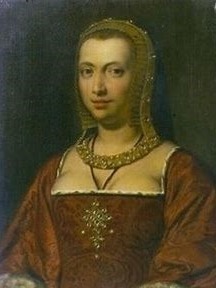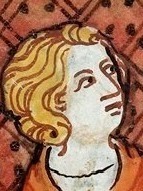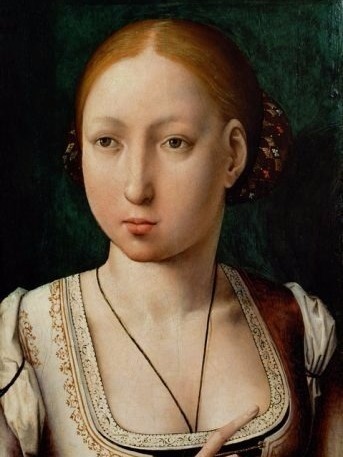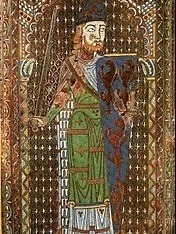Family tree Snelder - Versteegh » King Fulk of Jerusalem (1089-1143)
Personal data King Fulk of Jerusalem
Source 1- He was born in the year 1089 in Angers, Maine-et-Loire, Pays de la Loire, France.
- Profession: Comte d'Anjou, Comte de Tours (vv.1109-1129), Comte du Maine (vv.1110-1129), Roi de Jérusalem (vv.1131-1143), Count of Anjou, King of England, Comte d'Anjou et du Maine, roi de Jérusalem, King of Jerusalem, Greve av Anjou Kung av Jerusalem.
- Resident: Acre (Akkon), Kingdom of Jerusalem.
- He died on November 20, 1143 in Acre, Outre-Mer, Jerusalem, Israel, he was 54 years old.
- A child of Fulk IV of Anjou and Bertrada of Montfort
Household of King Fulk of Jerusalem
He has/had a relationship with Ermengarde of Maine.
Child(ren):
Notes about King Fulk of Jerusalem
https://en.wikipedia.org/wiki/Fulk,_King_of_Jerusalem
Fulk (Latin: Fulco, French: Foulque or Foulques; c. 1089/92 – 13 November 1143), also known as Fulk the Younger, was the Count of Anjou (as Fulk V) from 1109 to 1129 and the King of Jerusalem from 1131 to his death. During his reign, the Kingdom of Jerusalem reached its largest territorial extent.
Fulk was born at Angers, between 1089 and 1092, the son of Count Fulk IV of Anjou and Bertrade de Montfort. In 1092, Bertrade deserted her husband and bigamously married King Philip I of France.
He became count of Anjou upon his father's death in 1109. In the next year, he married Ermengarde of Maine, cementing Angevin control over the County of Maine.
He was originally an opponent of King Henry I of England and a supporter of King Louis VI of France, but in 1118 or 1119 he had allied with Henry when he arranged for his daughter Matilda to marry Henry's son and heir, William Adelin. Fulk went on crusade in 1119 or 1120, and became attached to the Knights Templar (Orderic Vitalis). He returned, late in 1121, after which he began to subsidize the Templars, maintaining two knights in the Holy Land for a year. Much later, Henry arranged for his daughter Matilda to marry Fulk's son Geoffrey of Anjou, which she did in 1127 or 1128.
By 1127 Fulk was preparing to return to Anjou when he received an embassy from King Baldwin II of Jerusalem. Baldwin II had no male heirs but had already designated his daughter Melisende to succeed him. Baldwin II wanted to safeguard his daughter's inheritance by marrying her to a powerful lord. Fulk was a wealthy crusader and experienced military commander, and a widower. His experience in the field would prove invaluable in a frontier state always in the grip of war.
However, Fulk held out for better terms than mere consort of the Queen; he wanted to be king alongside Melisende. Baldwin II, reflecting on Fulk's fortune and military exploits, acquiesced. Fulk abdicated his county seat of Anjou to his son Geoffrey and left for Jerusalem, where he married Melisende on 2 June 1129. Later Baldwin II bolstered Melisende's position in the kingdom by making her sole guardian of her son by Fulk, Baldwin III, born in 1130.
Fulk and Melisende became joint rulers of Jerusalem in 1131 with Baldwin II's death. From the start Fulk assumed sole control of the government, excluding Melisende altogether. He favored fellow countrymen from Anjou to the native nobility. The other crusader states to the north feared that Fulk would attempt to impose the suzerainty of Jerusalem over them, as Baldwin II had done; but as Fulk was far less powerful than his deceased father-in-law, the northern states rejected his authority. Melisende's sister Alice of Antioch, exiled from the Principality by Baldwin II, took control of Antioch once more after the death of her father. She allied with Pons of Tripoli and Joscelin II of Edessa to prevent Fulk from marching north in 1132; Fulk and Pons fought a brief battle before peace was made and Alice was exiled again.
In Jerusalem as well, Fulk was resented by the second generation of Jerusalem Christians who had grown up there since the First Crusade. These "natives" focused on Melisende's cousin, the popular Hugh II of Le Puiset, count of Jaffa, who was devotedly loyal to the Queen. Fulk saw Hugh as a rival, and it did not help matters when Hugh's own stepson accused him of disloyalty. In 1134, in order to expose Hugh, Fulk accused him of infidelity with Melisende. Hugh rebelled in protest. Hugh secured himself to Jaffa, and allied himself with the Muslims of Ascalon. He was able to defeat the army set against him by Fulk, but this situation could not hold. The Patriarch interceded in the conflict, perhaps at the behest of Melisende. Fulk agreed to peace and Hugh was exiled from the kingdom for three years, a lenient sentence.
However, an assassination attempt was made against Hugh. Fulk, or his supporters, were commonly believed responsible, though direct proof never surfaced. The scandal was all that was needed for the queen's party to take over the government in what amounted to a palace coup. Author and historian Bernard Hamilton wrote that Fulk's supporters "went in terror of their lives" in the palace. Contemporary author and historian William of Tyre wrote of Fulk "he never attempted to take the initiative, even in trivial matters, without (Melisende's) consent". The result was that Melisende held direct and unquestioned control over the government from 1136 onwards. Sometime before 1136 Fulk reconciled with his wife, and a second son, Amalric was born.
Jerusalem's northern border was of great concern. Fulk had been appointed regent of the Principality of Antioch by Baldwin II. As regent he had Raymund of Poitou marry the infant Constance of Antioch, daughter of Bohemund II and Alice of Antioch, and niece to Melisende. However, the greatest concern during Fulk's reign was the rise of Atabeg Zengi of Mosul.
In 1137 Fulk was defeated in battle near Baarin but allied with Mu'in ad-Din Unur, the vizier of Damascus. Damascus was also threatened by Zengi. Fulk captured the fort of Banias, to the north of Lake Tiberias and thus secured the northern frontier.
Fulk also strengthened the kingdom's southern border. His butler Paganus built the fortress of Kerak to the east of the Dead Sea, and to help give the kingdom access to the Red Sea, Fulk had Blanchegarde, Ibelin, and other forts built in the south-west to overpower the Egyptian fortress at Ascalon. This city was a base from which the Egyptian Fatimids launched frequent raids on the Kingdom of Jerusalem and Fulk sought to neutralise this threat.
In 1137 and 1142, Byzantine emperor John II Comnenus arrived in Syria attempting to impose Byzantine control over the crusader states. John's intention of making a pilgrimage, accompanied by his impressive army, to Jerusalem alarmed Fulk, who wrote to John pointing out that his kingdom was poor and could not support the passage of a large army. This lukewarm response dissuaded John from carrying through his intention, and he postponed his pilgrimage. John died before he could make good his proposed journey to Jerusalem.[2]
In 1143, while the king and queen were on holiday in Acre, Fulk was killed in a hunting accident.[3] His horse stumbled, fell, and Fulk's skull was crushed by the saddle, "and his brains gushed forth from both ears and nostrils", as William of Tyre describes. He was carried back to Acre, where he lay unconscious for three days before he died. He was buried in the Church of the Holy Sepulchre in Jerusalem. Though their marriage started in conflict, Melisende mourned for him privately as well as publicly. Fulk was survived by his son Geoffrey of Anjou by his first wife, and Baldwin III and Amalric I by Melisende.
According to William, Fulk was "a ruddy man, like David... faithful and gentle, affable and kind... an experienced warrior full of patience and wisdom in military affairs." His chief fault was an inability to remember names and faces.
William of Tyre described Fulk as a capable soldier and able politician, but observed that Fulk did not adequately attend to the defense of the crusader states to the north. Ibn al-Qalanisi (who calls him al-Kund Anjur, an Arabic rendering of "Count of Anjou") says that "he was not sound in his judgment nor was he successful in his administration." The Zengids continued their march on the crusader states, culminating in the fall of the County of Edessa in 1144, which led to the Second Crusade (see Siege of Edessa).
In 1110, Fulk married Ermengarde of Maine (died 1126), the daughter of Elias I of Maine. Their four children were:
- Geoffrey V of Anjou (1113–1151, father of Henry II of England.
- Sibylla of Anjou (1112–1165, Bethlehem), married in 1123 William Clito (div. 1124), married in 1134 Thierry, Count of Flanders.
- Matilda d'Anjou (1111–1154, Fontevrault), married William Adelin; after his death in the White Ship disaster of 1120, she became a nun and later Abbess of Fontevrault.
- Elias II of Maine (died 1151)
His second wife was Melisende, Queen of Jerusalem
Timeline King Fulk of Jerusalem
 grandparents
grandparents
 parents
parents
 brothers/sisters
brothers/sisters
 children
children
Ancestors (and descendant) of Fulk of Jerusalem
Fulk of Jerusalem 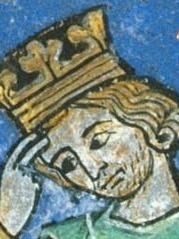 | |||||||||||||||||||||||||||||||||||
Ermengarde of Maine | |||||||||||||||||||||||||||||||||||
Relationship King Fulk of Jerusalem
- Fulk of Jerusalem is the 45th great grandson of Titus Manlius Imperiosus Torquatus:Titus Manlius Imperiosus TorquatusTitus Manlius TorquatusTitus Manlius TorquatusAulus Manlius TorquatusTitus Manlius TorquatusDecimus Junius Silanus ManlianusMarcus Junius Silanus consulMarcus Junius SilanusMarcus Junius Silanus consulMarcus Junius SilanusJunia Calvina EquitusGaius SallustiusGaius Ummidius Quadratus SallustiusGaius Ummidius Quadratus Annianus VerusGaius Ummidius Quadratus Annianus Verus FulviusUmmidia Commificia AntoniaPendania Pedanius FuscusMariana MinorAurelia PompeianaClaudiaConstantius I Chlorus of RomeUnkownProcopius UsurperProcopiusProcopius II Magister Militum of ByzantiumProcopius Anthemius I of the of the Western Roman EmpireAlypia Princess of the of RomeCaratene Agrippina of NarbonneClothilde of BurgundyChlothar I of the FranksChilperic I of the FranksChlotar II of the FranksDagobert I of AustrasiaSigebert III of AustrasiaDagobert II Of AustrasiaSigebert IV of RazeSigebert V of RazeThierry IV of ToulouseSenegundaRaymond I of ToulouseRaimonde of LimogesAubry I of MaconLiétald II of MaconAlberic II of MaconBeatrice of MâconGeoffrey II of GâtinaisFulk IV of AnjouFulk of Jerusalem
Sources
- WikiTree, via https://www.myheritage.nl/research/colle...
Fulk d'Anjou (geboren Anjou)Geslacht: ManGeboorte: Ongeveer 1092 - Anjou, FranceHuwelijk: 11 jul 1110 - Anjou, Rhone-Alpes, FranceHuwelijk: 1129 - FranceOverlijden: 13 nov 1144 - Acre, Outre-Mer, Jerusalem, IsraelVader: Foulques d'Anjou (geboren Anjou)Moeder: Bertrade Capet (geboren Montfort)Echtgenote(n/s): Ermengarde d'Anjou (geboren Maine)Melisende d'Anjou (geboren Rethel)Kinderen: Geoffrey d'Anjou (geboren Anjou)Sibylle de Alsace (geboren Anjou)Elias du Maine (geboren Anjou)Alice d'Anjou (geboren Anjou)Amaury d'Anjou (geboren Anjou)Baudouin d'Anjou (geboren Anjou)Foto's:
www.wikitree.com
Matches in other publications
This person also appears in the publication:Same birth/death day
- 1008 » Geoffrey I, duke of Brittany (b. 980)
- 1022 » Bernward of Hildesheim, German bishop (b. c. 960)
- 1314 » Albert II, German nobleman (b. 1240)
- 1316 » John I, king of France and Navarra (b. 1316)
- 927 » Xu Wen, Chinese general (b. 862)
- 996 » Richard I, duke of Normandy (b. 932)
About the surname Of Jerusalem
- View the information that Genealogie Online has about the surname Of Jerusalem.
- Check the information Open Archives has about Of Jerusalem.
- Check the Wie (onder)zoekt wie? register to see who is (re)searching Of Jerusalem.
Roel Snelder, "Family tree Snelder - Versteegh", database, Genealogy Online (https://www.genealogieonline.nl/stamboom-snelder-versteegh/I505627.php : accessed June 5, 2024), "King Fulk of Jerusalem (1089-1143)".



